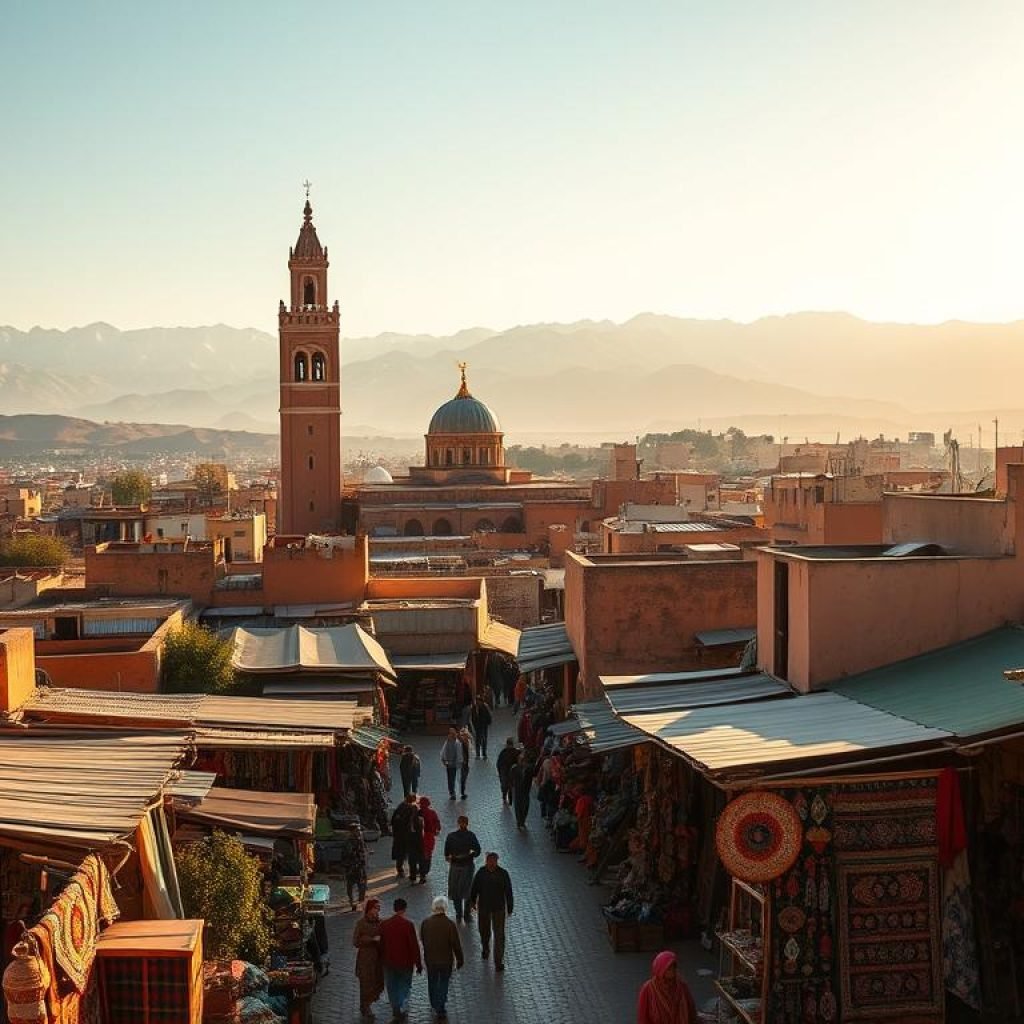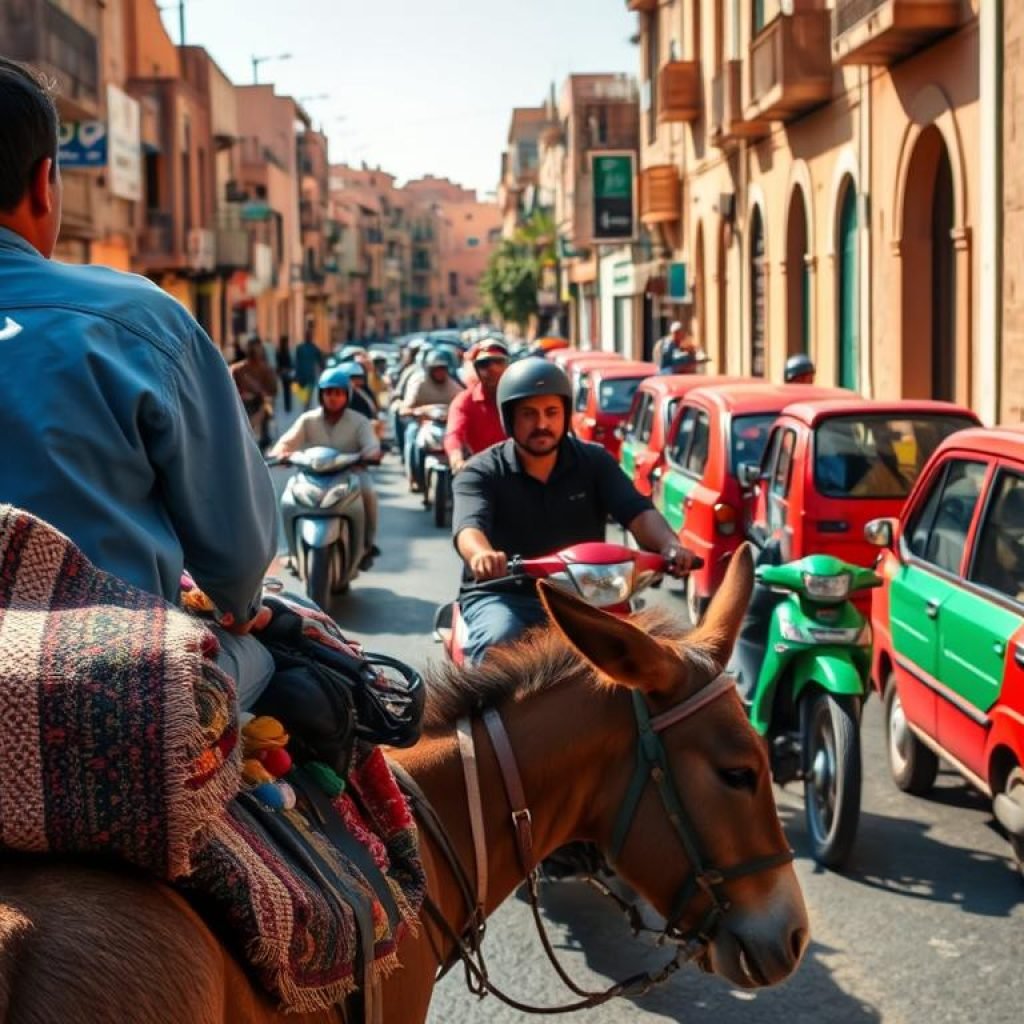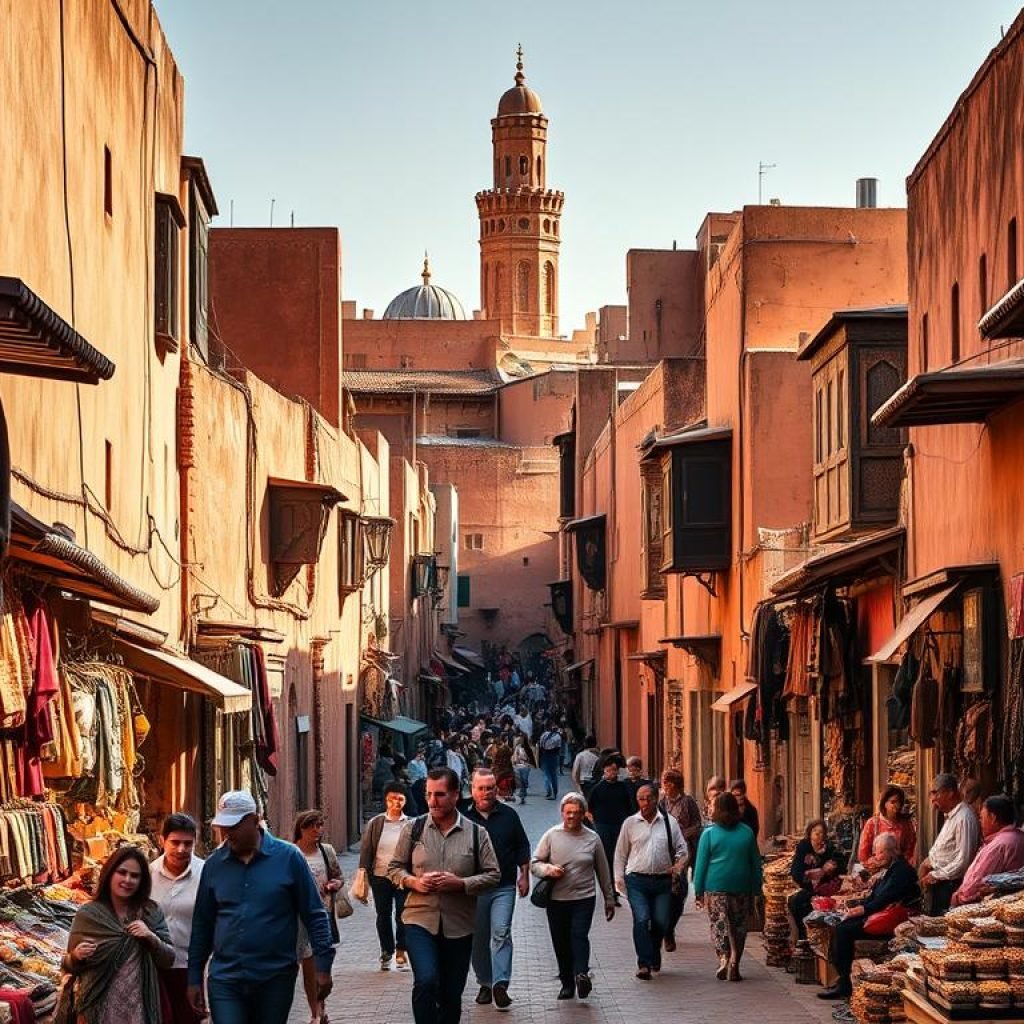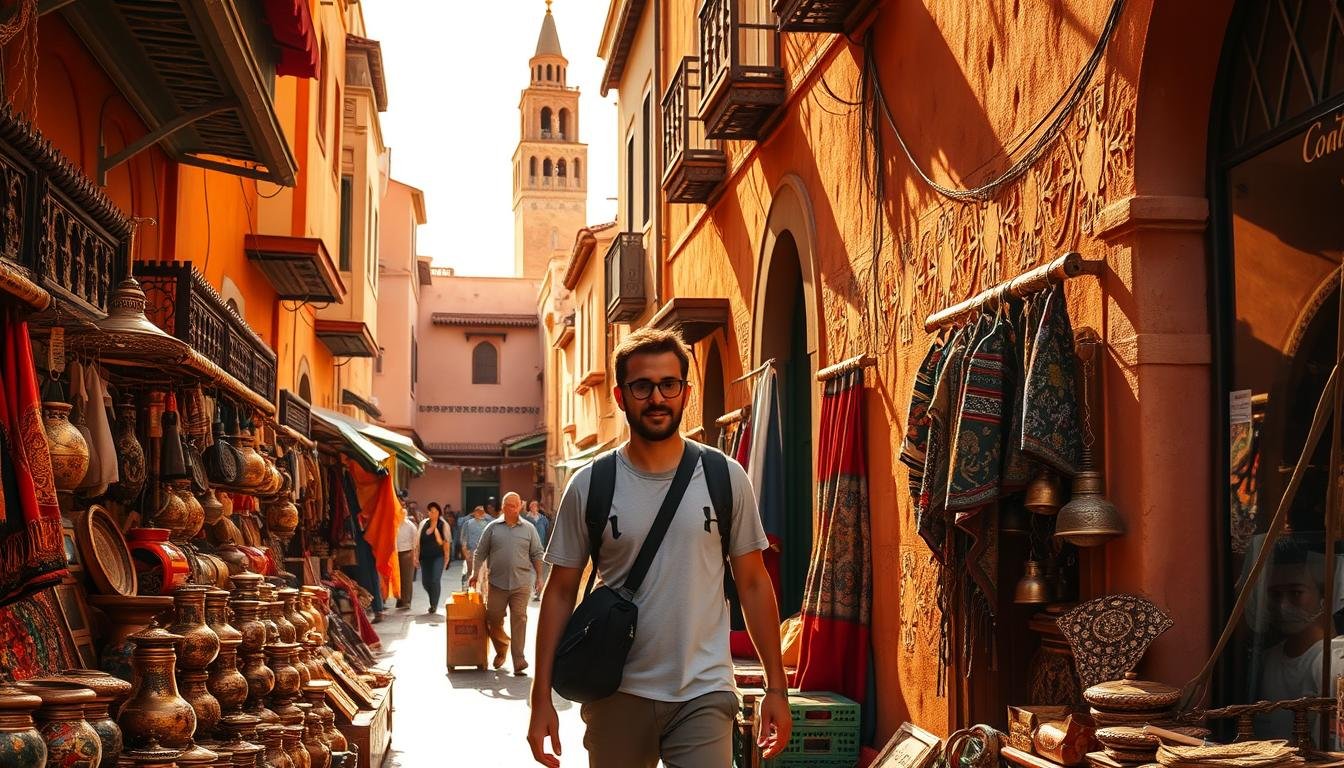Embarking on a solo adventure can be both thrilling and daunting. Morocco, with its vibrant culture and stunning landscapes, offers an unforgettable experience for those willing to explore independently. However, navigating this North African gem requires preparation and awareness to ensure a safe and enjoyable trip.
Drawing from firsthand experiences, this guide provides essential tips to help you stay safe and make the most of your journey. From understanding local customs to choosing reliable accommodations, these insights will empower you to confidently navigate Morocco’s bustling medinas and serene deserts.
Whether you’re wandering through the blue streets of Chefchaouen or marveling at the Hassan II Mosque, this guide blends practical advice with cultural etiquette. It’s designed to help you embrace the adventure while staying mindful of your surroundings.
Key Takeaways
- Prepare thoroughly to ensure a safe and smooth experience.
- Respect local customs and dress modestly to blend in.
- Choose trusted accommodations like Riad Botanica for comfort and security.
- Stay aware of your surroundings, especially in crowded areas.
- Use guided tours to navigate complex cities like Fes and Marrakech.
- Embrace the vibrant culture and explore both popular and hidden gems.
- Connect with fellow travelers for shared experiences and support.
Introduction to Morocco Solo Travel
Exploring Morocco on your own offers a blend of adventure and cultural immersion. This North African gem is known for its vibrant markets, stunning landscapes, and warm hospitality. Whether you’re wandering through ancient medinas or trekking the Atlas Mountains, the country provides a unique experience for every traveler.
Morocco is widely regarded as a safe and welcoming destination for those traveling independently. The locals are friendly, and the country’s infrastructure supports visitors well. However, like any journey, preparation is key to ensuring a smooth and enjoyable experience.
Researching local customs, languages, and weather conditions can make a significant difference. For example, staying in traditional riads like Riad Botanica offers both comfort and an authentic cultural experience. Understanding these nuances helps you navigate the country with confidence.
This guide will cover essential topics such as transportation, must-see attractions, and safety tips. It’s designed to empower you with the right information for your journey. From bustling cities to serene deserts, Morocco promises an unforgettable adventure for those willing to explore independently.
Understanding Morocco’s Unique Culture and Safety
Understanding Morocco’s unique culture is key to a safe and enriching journey. The country’s vibrant traditions and warm hospitality create a welcoming atmosphere for visitors. However, blending in and staying aware of your surroundings ensures a smooth experience.

Embracing Local Customs
Morocco’s rich cultural heritage influences daily life in many ways. Dressing modestly, especially in religious areas, shows respect for local traditions. Learning a few phrases in Moroccan Darija can also enhance interactions and demonstrate cultural appreciation.
For example, in Marrakech’s medina, greeting shopkeepers with a polite “Salam” can open doors to friendly conversations. Engaging with local hosts or guides helps you navigate cultural nuances and avoid misunderstandings.
Staying Aware in Crowded Areas
Crowded medinas and souks are part of Morocco’s charm but require vigilance. Keep valuables secure and avoid displaying expensive items like phones or jewelry. Staying in well-lit, busy areas reduces risks, especially at night.
In Marrakech, hiring a guide can help you navigate the maze-like streets safely. They provide insights into the culture while ensuring you avoid common pitfalls in tourist-heavy zones.
| Safety Tip | Why It Matters |
|---|---|
| Dress modestly | Shows respect for local customs and reduces unwanted attention. |
| Use a money belt | Keeps cash and valuables secure in crowded areas. |
| Hire a local guide | Ensures safe navigation and deeper cultural understanding. |
By embracing Morocco’s culture and staying alert, you can enjoy a safe and memorable adventure. Respectful behavior and practical precautions go a long way in enhancing your experience.
Essential Preparation for Your Solo Adventure
Preparation is the cornerstone of any successful independent journey. Taking the time to plan and pack thoughtfully ensures a smooth and enjoyable experience. From clothing to safety gear, every detail matters when you’re exploring on your own.
Packing Essentials and Safety Gear
Packing for an independent journey requires a balance of practicality and cultural awareness. Breathable clothing is a must for hot days, while layers are essential for cooler evenings. Comfortable walking shoes, a wide-brimmed hat, and sunscreen are non-negotiable items.
Respecting local customs is crucial. Modest, loose-fitting clothes help you blend in and show cultural sensitivity. Carrying a scarf or shawl is a versatile way to adapt to different settings, from religious sites to casual outings.
Safety gear is equally important. A money belt keeps valuables secure in crowded areas. A portable power bank ensures your phone stays charged, while a local SIM card keeps you connected. Having emergency contact numbers saved, including your accommodation and local authorities, provides peace of mind.
| Item | Purpose |
|---|---|
| Breathable clothing | Keeps you cool in hot weather. |
| Comfortable shoes | Essential for long walks and uneven terrain. |
| Scarf or shawl | Adapts to cultural and weather needs. |
| Money belt | Secures cash and valuables. |
| Power bank | Keeps devices charged on the go. |
Adapting your wardrobe to fluctuating temperatures and cultural norms is key. Layering allows you to stay comfortable throughout the day. A lightweight jacket or cardigan is perfect for cooler evenings.
Preparation turns potential challenges into manageable experiences. By packing thoughtfully and staying aware, you can focus on enjoying your adventure to the fullest.
Navigating Morocco: Transportation and Communication
Getting around Morocco efficiently is key to a smooth and enjoyable experience. The country offers a variety of transportation options, from trains and buses to taxis, making it easy to explore its vibrant cityscapes and serene landscapes. Understanding how to use these systems and communicate effectively ensures a stress-free journey.

Using Public Transit Effectively
Morocco’s public transit system is reliable and affordable. The ONCF rail service connects major cities like Casablanca, Rabat, and Marrakech. Train tickets range from 30 dirham ($3) for short trips to 628 dirham ($63) for long-distance routes. Buses, such as CTM and SupraTours, are another great option, with fares starting at 60 dirham ($6).
For shorter distances, local taxis are convenient. Petite Taxis charge a minimum of 7 dirham ($0.70) during the day, while Grand Taxis are ideal for longer trips. Always confirm fares before starting your ride, especially after sunset when prices double.
- Book train tickets in advance for long-distance trips.
- Use reputable bus services like CTM for comfort and reliability.
- Negotiate taxi fares upfront to avoid surprises.
Overcoming Language Barriers
While Arabic and French are widely spoken, learning a few basic phrases can make a big difference. Simple greetings like “Salam” (hello) or “Shukran” (thank you) show respect and help you connect with locals. Many Moroccans in tourist areas also speak English, but having a guide or translation app can be invaluable.
Here are some useful phrases to get started:
- “Kayfa haluk?” (How are you?)
- “Bhalash?” (How much?)
- “Wayn al-hammam?” (Where is the bathroom?)
By mastering these basics, you’ll navigate Morocco with confidence and ease.
Must-See Destinations in Morocco
Morocco is a land of contrasts, where ancient traditions meet modern vibrancy. From bustling medinas to serene deserts, this North African gem offers a diverse range of experiences. Whether you’re drawn to iconic landmarks or hidden treasures, the country’s rich heritage promises an unforgettable trip.
Exploring Iconic Sites and Hidden Gems
Marrakech, one of Morocco’s most vibrant cities, is home to must-see attractions like the Jardin Majorelle and Bahia Palace. These sites showcase the city’s blend of historical architecture and local charm. The medina, a UNESCO World Heritage site, is a maze of narrow streets filled with colorful souks and hidden courtyards.
Beyond Marrakech, Fes offers a glimpse into Morocco’s medieval past. The Fes el Bali medina is one of the world’s largest car-free urban areas, brimming with artisan workshops and ancient mosques. For a quieter experience, Chefchaouen’s blue-painted streets provide a serene escape in the Rif Mountains.
Each destination offers a unique experience, from the bustling energy of Casablanca to the coastal charm of Essaouira. Exploring these cities allows you to immerse yourself in Morocco’s rich culture and history.
To make the most of your trip, prioritize visits based on your interests. Insider tips and guided tours can help you navigate complex medinas and uncover hidden gems. Whether you’re marveling at architectural wonders or strolling through tranquil gardens, Morocco’s destinations promise a journey of discovery.
Practical Tips for Enjoying the Medinas and Souks
Navigating the vibrant medinas and souks of Morocco is an adventure in itself. These bustling markets are the heart of the country’s cultural and economic life, offering everything from spices to handcrafted goods. To make the most of your experience, it’s essential to understand the local etiquette and navigate the crowded streets with confidence.

Bartering and Local Etiquette
Bartering is a key part of shopping in Moroccan souks. Start by offering half the asking price and negotiate politely. Remember, it’s a cultural exchange, not a battle. A friendly smile and a few words in Moroccan Arabic, like “Shukran” (thank you), can go a long way.
Respect is crucial. Avoid aggressive haggling, as it can offend vendors. Instead, engage in light conversation and show genuine interest in their products. This approach not only helps you get a fair price but also enriches your understanding of the local culture.
Navigating Busy Market Streets
The narrow, winding streets of the medina can be overwhelming. Stay aware of your surroundings and keep valuables secure. A money belt or crossbody bag is a practical tip for safeguarding your belongings.
If you feel lost, don’t hesitate to ask for directions. Many locals are happy to help, though it’s wise to confirm the route with a second person. Hiring a local guide can also ensure you navigate the maze-like alleys safely while gaining deeper insights into the market’s history and significance.
- Start bartering at half the asking price and negotiate respectfully.
- Keep valuables secure in crowded areas to avoid petty theft.
- Use a guide to navigate complex medinas and learn about their history.
- Engage with vendors politely to enhance your shopping experience.
By following these practical tips, you can enjoy the vibrant energy of Morocco’s medinas and souks while staying safe and respectful. Embrace the chaos, and you’ll discover a world of treasures waiting to be explored.
Using “Solo travel Morocco tips” for a Smooth Journey
Exploring Morocco independently can be a rewarding experience with the right preparation. Leveraging expert guidance and curated tips ensures a secure and hassle-free adventure. Professionals like Jamie Gallerani offer invaluable insights to help you navigate challenges and make the most of every moment.
Expert Guidance in Solo Travel
Having a knowledgeable guide can significantly enhance your experience. They provide on-the-ground tips, help you overcome common obstacles, and ensure you stay safe while exploring. Whether it’s navigating bustling medinas or understanding local customs, their expertise is invaluable.
Here are some key benefits of using professional advice:
- Gain confidence in unfamiliar environments.
- Learn how to respect and engage with local culture.
- Access hidden gems and off-the-beaten-path locations.
- Ensure safety and security throughout your journey.
For example, dressing modestly and hiring a local guide in Marrakech can help you avoid unwanted attention and navigate the city’s maze-like streets. These small but impactful steps build traveler confidence and lead to more enriching experiences.
By following these tips, you can focus on enjoying Morocco’s vibrant culture and stunning landscapes. Preparation and expert guidance turn potential challenges into manageable moments, making your solo travel journey unforgettable.
Day Trips and Local Experiences
Stepping outside the bustling city centers opens up a world of unique experiences in Morocco. Whether you’re seeking scenic landscapes or authentic cultural encounters, short excursions provide a refreshing break from urban life. These day trips allow you to explore the country’s diverse heritage and connect with its vibrant communities.
Short Excursions Beyond the City
Just an hour outside Marrakech lies the Agafay Desert, a stunning alternative to the Sahara. This rocky landscape offers camel rides, ATV adventures, and luxurious desert camps with breathtaking views. It’s a perfect trip for those looking to escape the city without traveling far.
Another popular destination is the Ourika Valley, known for its lush greenery and traditional Berber villages. Here, you can hike to waterfalls, enjoy mint tea with local families, and learn about rural life. These excursions provide a peaceful contrast to the hustle of urban centers.
Immersive Cultural Tours
For a deeper connection to Morocco’s heritage, consider joining a cultural tour. These experiences often include visits to rural villages, where you can participate in traditional crafts or cooking classes. Engaging with local communities offers insights into their way of life and fosters meaningful connections.
One example is a tour of the Atlas Mountains, where you can meet Amazigh families and learn about their customs. These adventures not only enrich your understanding of Moroccan culture but also support sustainable tourism initiatives.
Exploring off-the-beaten-path destinations adds depth to your journey. Whether it’s a scenic hike or a cultural exchange, these day trips create lasting memories and a deeper appreciation for Morocco’s diverse landscapes and traditions.
Accommodations and Staying Safe
Choosing the right place to stay is crucial for a secure and comfortable trip. Your lodging sets the tone for your experience, offering a safe haven after a day of exploration. Whether you prefer the charm of a traditional riad or the modern amenities of a hotel, selecting the right accommodation ensures peace of mind.
Selecting the Right Riad or Hotel
Traditional riads, like Riad Botanica, offer a unique blend of culture and comfort. These local homes often feature intricate designs, courtyards, and personalized service. Staying in a riad allows you to immerse yourself in Moroccan heritage while enjoying a secure environment.
Modern hotels, on the other hand, provide convenience and consistency. They are ideal for travelers who prioritize amenities like Wi-Fi, air conditioning, and 24-hour service. Both options have their merits, so consider your preferences and needs when making a choice.
Here are some tips for selecting the right accommodation:
- Read reviews from trusted sources to gauge reliability and safety.
- Choose properties with responsive local staff for better assistance.
- Verify the location to ensure easy access to key attractions.
- Look for secure features like 24-hour reception and in-room safes.
Well-chosen accommodations enhance your overall experience. They provide a comfortable home base, making it easier to navigate the city and enjoy your journey. Trusted recommendations, like Riad Botanica, can bolster your confidence and ensure a memorable stay in Morocco.
Culinary Adventures: Discovering Moroccan Cuisine
Moroccan cuisine is a vibrant tapestry of flavors and traditions, offering a unique culinary journey. From the aromatic spices of tagines to the comforting warmth of couscous, every dish tells a story of cultural heritage. Exploring this rich culinary landscape is an essential part of any visit to Morocco.
Savoring Traditional Tagines and Couscous
Tagines, slow-cooked stews of meat, vegetables, and spices, are a cornerstone of Moroccan cuisine. These dishes are often served in traditional clay pots, which help retain moisture and flavor. Couscous, a staple in many households, is typically enjoyed on Fridays and during special occasions.
For an authentic experience, visit local markets or dine at renowned restaurants like Le Tanjia in Marrakech. These spots offer a true taste of Moroccan tradition, with dishes prepared using time-honored techniques.
Recommended Dining Spots
Here are some top places to savor authentic Moroccan dishes:
| Restaurant | Specialty |
|---|---|
| Le Tanjia | Traditional tagines and grilled meats |
| Atay Café | Mint tea and Moroccan pastries |
| Riad Botanica | Modern twists on classic dishes |
Food is more than just sustenance in Morocco; it’s a way to connect with the culture. Trying local dishes enhances your trip and deepens your appreciation for the country’s traditions. Whether you’re dining in a bustling market or a cozy riad, every meal is an opportunity to explore Moroccan heritage.
Outdoor Adventures: From the Sahara to the Atlas Mountains
Morocco’s landscapes offer a playground for outdoor enthusiasts, from golden dunes to towering peaks. Whether you’re drawn to the vast desert or the rugged mountains, the country’s natural beauty promises unforgettable experiences. These destinations are perfect for those seeking adventure and a deeper connection with nature.
Desert Excursions and Sahara Safaris
The Sahara Desert is a must-visit for anyone exploring Morocco. Its endless golden dunes and starry skies create a magical setting. Camel treks are a popular way to experience the desert, offering a unique perspective of this vast landscape.
For a more immersive experience, consider a guided Sahara safari. These tours often include overnight stays in traditional Berber camps, where you can enjoy local cuisine and music. The tranquility of the desert is a stark contrast to the bustling cities, making it a perfect escape.
Hiking the Atlas Mountains
The Atlas mountains provide a different kind of adventure. With trails ranging from easy walks to challenging treks, there’s something for every skill level. The High Atlas region is particularly popular, offering stunning views and encounters with local Berber villages.
Before embarking on a mountain hike, ensure you’re well-prepared. Wear sturdy shoes, carry plenty of water, and check the weather forecast. Hiring a local guide can enhance your experience, providing insights into the terrain and culture.
| Activity | Tips for Success |
|---|---|
| Desert Excursions | Wear lightweight clothing, stay hydrated, and protect yourself from the sun. |
| Sahara Safaris | Book with a reputable tour operator and bring a camera for stunning photos. |
| Hiking the Atlas Mountains | Pack layers, snacks, and a first-aid kit for safety and comfort. |
These outdoor activities highlight Morocco’s diverse landscapes and rich culture. Whether you’re trekking through the mountains or exploring the desert, each journey offers a chance to connect with nature and create lasting memories.
Connecting with Locals and Travel Community
Building connections with locals and fellow travelers can transform your journey into a rich, shared experience. These interactions not only enhance your understanding of the culture but also create lasting memories. Whether you’re exploring bustling markets or serene landscapes, engaging with the community adds depth to your adventure.
Building Friendships on the Road
One of the most rewarding aspects of traveling is the opportunity to meet new people. Joining a group tour or participating in community activities can help you connect with like-minded individuals. These shared experiences often lead to meaningful friendships and a sense of belonging, even when you’re far from home.
For example, joining a guided tour in the Sahara or Atlas Mountains not only ensures safety but also fosters camaraderie among travellers. As one participant shared,
“The friendships I made during the tour turned a solo trip into a shared adventure.”
Engaging with local residents is equally important. From sharing a meal with a Berber family to learning traditional crafts, these interactions provide authentic insights into the culture. A knowledgeable guide can facilitate these connections, ensuring you gain a deeper appreciation for the places you visit.
| Benefit | Why It Matters |
|---|---|
| Shared Experiences | Creates lasting memories and friendships. |
| Cultural Insights | Deepens understanding of local traditions. |
| Safety in Numbers | Group activities enhance security in unfamiliar places. |
| Local Connections | Facilitates authentic interactions and learning. |
For those seeking structured experiences, consider joining a guided tour that combines the Sahara Desert and Atlas Mountains. These tours not only offer stunning landscapes but also opportunities to connect with fellow adventurers and local communities.
Ultimately, forming genuine connections makes your journey more memorable and fulfilling. Whether through shared adventures or heartfelt conversations, these moments enrich your travel narrative and leave a lasting impact.
Conclusion
Morocco offers a unique blend of culture, adventure, and natural beauty, making it an ideal destination for independent explorers. By preparing thoroughly and respecting local customs, you can ensure a safe and enriching experience. From the bustling medinas to the serene Sahara, every moment in this vibrant country is an opportunity for discovery.
Expert advice and careful planning are key to a smooth journey. Whether you’re savoring traditional cuisine or hiking the Atlas Mountains, these tips help you navigate challenges with confidence. Embracing the adventure with an open mind allows you to fully appreciate Morocco’s rich heritage and stunning landscapes.
For added support, consider booking guided tours or connecting with fellow travelers. With the right preparation, your trip to Morocco promises to be both safe and unforgettable. Start planning today and get ready to explore this captivating country on your own terms.




Comment (0)